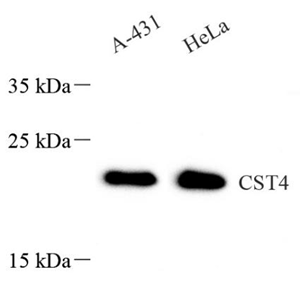Anti-Cystatin S Rabbit pAb (100 μl)
| Reactivity: | M,R |
| Applications: | IHC/IF |
| Host Species: | Rabbit |
| Clonality: | Polyclonal |
| Full Name: | Cystatin S rabbit polyclonal antibody |
Gene Name: | Cystatin-S |
Synonyms: | CST4, Cystatin 4, cystatin S, Cystatin SA III, Salivary acidic protein 1 |
Immunogen: | Recombinant protein corresponding to Human Cystatin S |
Isotype: | IgG |
Purity: | Affinity purification |
Predicted MW. | 16 kDa |
Observed MW. | 16 kDa |
Uniprot ID: | P01036 |
Product Usage Information
Applications | Species | Dilution | Positive Sample |
WB | Human | 1: 700-1: 1400 | A-431, HeLa |
Background
Cystatins are a family of inhibitors of cysteine peptidases that comprises the salivary cystatins D and S-type (including CST5 and CST4,1,2) and cystatin C-type (CST3) (PMID: 25329717). The D and S-type cystatin have also been detected in seminal plasma, tears, and tracheobronchial fluid but not in other fluids and secretions where cystatin C is found. And the CST4 was expressed in the serous acinar and demilune cells of the human submandibular gland and at lower levels in the serous acini of the parotid gland (PMID:11879580). CST4 specifically combines with cysteine protease to regulate its activity, thus preventing hydrolysis of the extracellular matrix. And some studies propose that CST4 might be a biomarker for gastrointestinal cancer (PMID:29218251; PMID:29636621).
Images
 | Western blot analysis of CST4 (GB114030) at dilution of 1: 1000 |
Storage
| Storage | Store at -20°C for one year. Avoid repeated freeze/thaw cycles. |
| Storage Buffer | PBS with 0.02%sodium azide,100 μg/ml BSA and 50% glycerol. |
